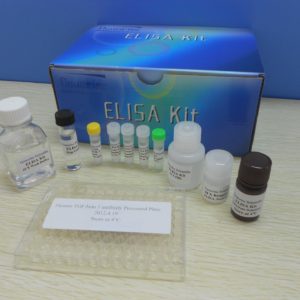Recombinant Human cTnI Protein
$99.00 – $2,280.00
The recombinant human cTnI protein is derived from in vitro expression of human cTnI gene in E. coli and purified using his-tag affinity column and can be used in multiple applications such as cell culture, ELISA and western blot.
Alternative names for cTnI: Cardiac troponin I, TNNI3
This product is for Laboratory Research Use Only not for diagnostic and therapeutic purposes or any other purposes.
- Description
- Product Citations
- Reviews (0)
Description
Genorise Recombinant Human cTnI Protein Summary
Alternative names for cTnI: Cardiac troponin I, TNNI3
Product Specifications
| Purity | > 97%, by SDSPAGE under reducing conditions and visualized by silver stain. |
| Endotoxin Level | < 0.1 EU per 1 μg of the protein by the LAL method. |
| Activity | na |
| Source | E. coli derived human cTnI. |
| Accession # | P19429 |
| N-Terminal Sequence Analysis | Arg |
| Amino Acid Sequence | Arg68 –Ser210 |
| Predicted Molecular Mass | 16 kDa |
| SDS-PAGE | 16 kDa, reducing conditions |
Background:
Troponin is a complex of three regulatory proteins (troponin C, troponin I, and troponin T) that is integral to muscle contraction in skeletal muscle and cardiac muscle, but not smooth muscle. Troponin I, cardiac muscle is a protein that in humans is encoded by the TNNI3 gene.[1] It is a tissue-specific subtype of troponin I, which in turn is a part of the troponin complex. TNNI3 has been shown to interact with PKD2L1,[2] Troponin C type 1[3] and Polycystic kidney disease 2.[4] An increased level of the cardiac protein isoform of troponin circulating in the blood has been shown to be a biomarker of heart disorders, the most important of which is myocardial infarction. Raised troponin levels indicate cardiac muscle cell death as the enzyme is released into the blood upon injury to the heart. Certain subtypes of troponin (cardiac I and T) are very sensitive and specific indicators of damage to the heart muscle (myocardium). They are measured in the blood to differentiate between unstable angina and myocardial infarction (heart attack) in people with chest pain or acute coronary syndrome. A person who had had a myocardial infarction would have an area of damaged heart muscle and so would have elevated cardiac troponin levels in the blood.[5] This can also occur in people with coronary vasospasm, a type of myocardial infarction involving severe constriction of the cardiac blood vessels. After a myocardial infarction troponins may remain high for up to 2 weeks.[6]
It is important to note that cardiac troponins are a marker of all heart muscle damage, not just myocardial infarction, which is the most severe form of heart disorder. However, diagnostic criteria for raised troponin indicating myocardial infarction is currently set by the WHO at a threshold of 2 ug or higher. Troponins are also increased in patients with heart failure, where they also predict mortality and ventricular rhythm abnormalities. They can rise in inflammatory conditions such as myocarditis and pericarditis with heart muscle involvement (which is then termed myopericarditis). Troponins can also indicate several forms of cardiomyopathy, such as dilated cardiomyopathy, hypertrophic cardiomyopathy or (left) ventricular hypertrophy, peripartum cardiomyopathy, Takotsubo cardiomyopathy, or infiltrative disorders such as cardiac amyloidosis. In a community-based cohort study indicating the importance of silent cardiac damage, troponin I has been shown to predict mortality and first coronary heart disease event in men free from cardiovascular disease at baseline.[7]
References
- Kimura A, et al. (1997). Nat Genet 16 (4): 379–82.
- Li Q, et al. (2003). Biochemistry (United States) 42 (24): 7618–25.
- Ward, DG, et al. (2004). Biochemistry (United States) 43 (13): 4020–7.
- Li, Qiang; et al. (2003). Biochemistry (United States) 42 (2): 450–7.
- Antman EM, et al. (1996). Engl. J. Med. 335 (18): 1342–9.
- Amsterdam, E. A.; et al. (2014). Circulation 130: e344–e426.
- Zethelius B, et al. (2006). Circulation 113 (8): 1071–8.
Product Citations
Be the first to review “Recombinant Human cTnI Protein”
You must be logged in to post a review.

























Reviews
There are no reviews yet.